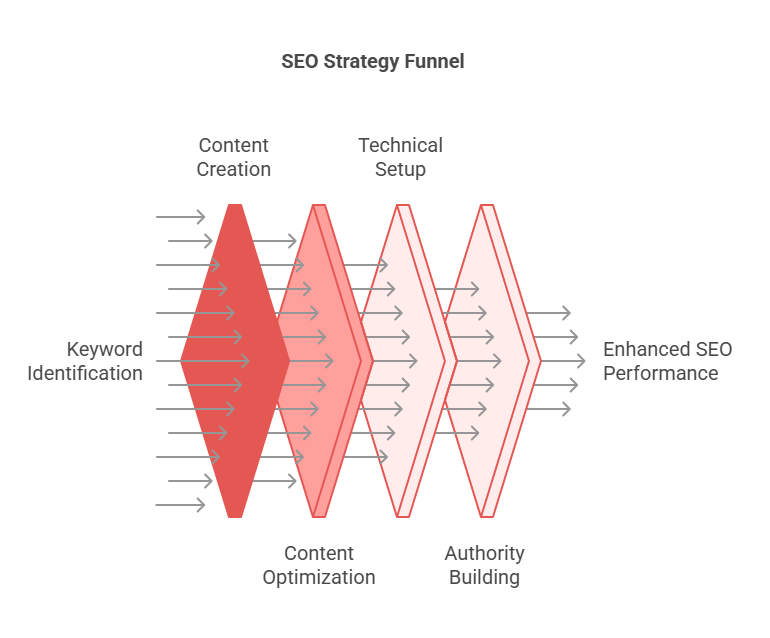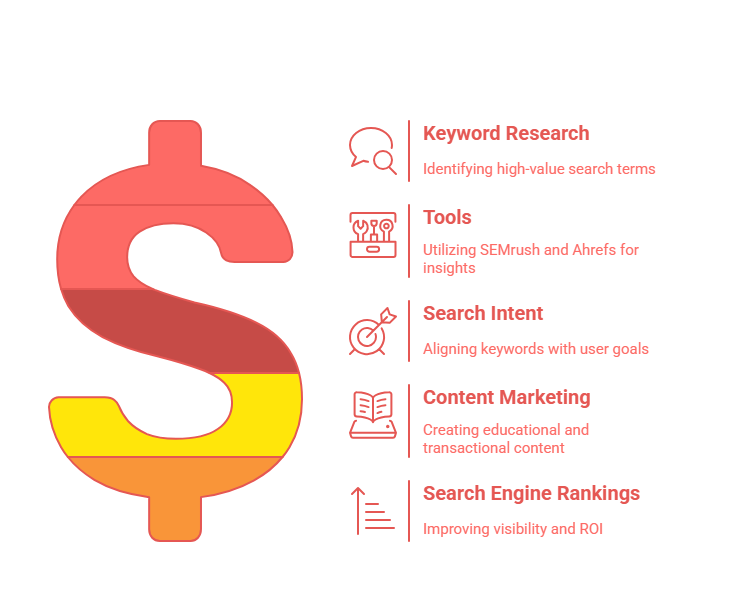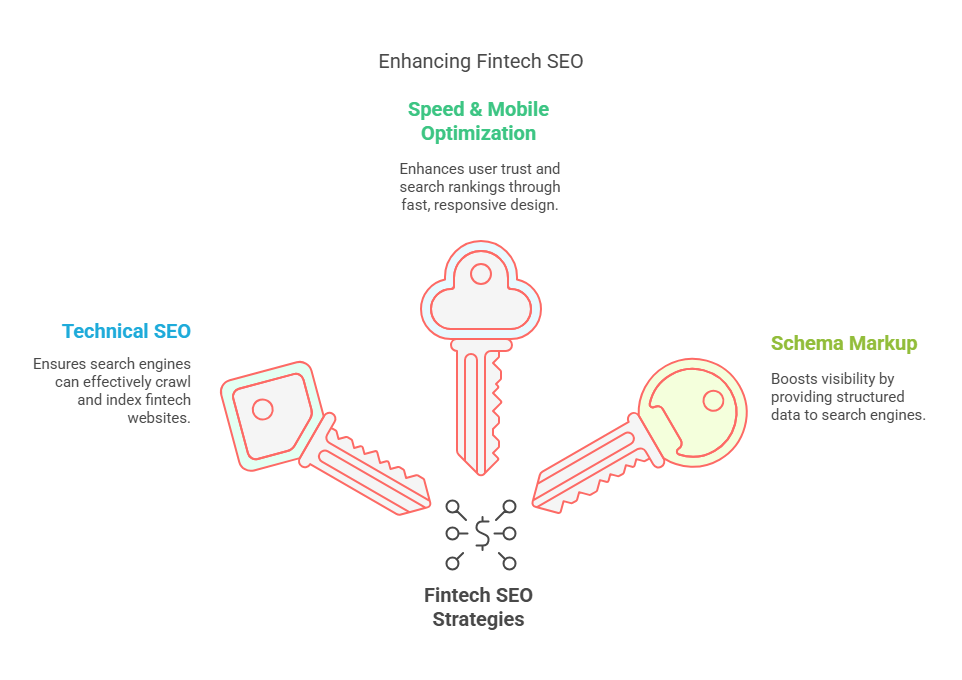In the hyper-competitive fintech industry, standing out requires more than innovative products—it demands a razor-sharp SEO strategy tailored to your audience. SEO for fintech isn’t just about ranking higher on Google; it’s about aligning your content with the exact pain points, questions, and commercial intent of your target market.
Whether you’re a B2B fintech provider, a startup, or an established player, a data-driven fintech SEO approach bridges the gap between your solutions and the users actively searching for them. This guide breaks down actionable steps to optimize your website, create high-converting content, and leverage technical strategies to dominate search results—transforming organic traffic into measurable leads and revenue.
What Is Fintech SEO?
Fintech SEO is the specialized practice of optimizing a fintech business website to rank higher in search engines for keywords that align with its target audience’s financial needs, pain points, and purchasing intent. Unlike generic SEO, fintech SEO requires a deep understanding of the industry’s regulatory complexities, technical jargon, and the high-trust relationship users demand from financial platforms.
At its core, fintech SEO strategy revolves around three pillars:
- Keyword Research: Identifying high-value terms (e.g., “B2B payment solutions” or “best expense tracking app for startups”) that your prospects search for at different stages of their journey.
- Content Optimization: Crafting content that answers user queries while strategically incorporating keywords, improving SEO performance, and guiding readers toward conversion.
- Technical & Authority Building: Ensuring your site architecture, speed, and backlink profile signal credibility to search engines.

For fintech companies, SEO performance isn’t just about traffic—it’s about attracting high-intent users searching for solutions like fraud detection software, API banking tools, or regulatory compliance platforms. By aligning your content with these searches, you position your brand as a trusted authority, driving qualified leads while reducing reliance on costly paid ads.
Keyword Research for Fintech: Targeting High-Intent Queries
For financial services companies, keyword research is the backbone of an effective SEO strategy. It’s about identifying search queries with strong commercial intent (e.g., “B2B payment gateway API” or “fraud detection SaaS pricing”) that your target audience actively uses.
Tools like SEMrush or Ahrefs help uncover terms with high monthly search volume, low competition, and search intent that aligns with your solutions. Prioritize transactional keywords like “buy” or “compare” for bottom-funnel pages, while educational terms (“how blockchain reduces cross-border fees”) work for top-funnel content marketing. This precision ensures your pages attract users ready to convert, boosting search engine rankings and ROI.

Competitor Keyword Analysis
Your competitors’ successes (and gaps) hold clues for dominating the fintech niche. Use tools like SEMrush to audit their top-ranking pages—see which keywords drive their traffic (e.g., “fintech compliance software” or “embedded finance platforms”) and reverse-engineer their strategies. For instance, if a rival ranks for “AI-powered expense management tools” but lacks content on SME use cases, create deeper, more comprehensive guides to fill that void. This tactic not only helps you steal their search engine rankings but also uncovers untapped search queries your target audience cares about.
Mapping Keywords to Customer Journey
Every search intent corresponds to a stage in the buyer’s journey. Map keywords like this:
- Awareness: “What is open banking?” (blogs/guides)
- Consideration: “Top crypto payment gateways 2024” (comparisons)
- Decision: “Payroll API integration costs” (product pages)
For fintech services companies, this alignment ensures your content marketing nurtures leads seamlessly. A startup searching for “best neobank solutions for startups” needs educational content first, then case studies, then pricing—each step optimized with stage-specific keywords. This structured approach builds trust, accelerates conversions, and ensures no high-intent query goes untapped.
Creating Content That Coverts With On-Page SEO For Fintech
In the fintech industry, on-page SEO for Fintech isn’t just about pleasing algorithms—it’s about crafting relevant content that aligns with user search intent to drive action. Start by auditing your fintech website to ensure every blog, product page, or guide answers specific queries. Use keyword-rich headers, clear CTAs, and data-driven insights to position your brand as an authority.
For instance, a page targeting “best payroll API for startups” should not only explain features but compare pricing, security, and ease of integration. This content strategy boosts online visibility while guiding users seamlessly from awareness to conversion.
Structuring Content for Fintech Buyer Journeys
Your fintech SEO strategy must mirror how your audience researches solutions. Break content into stages:
- Top of Funnel: Address pain points with guides like “How to reduce cross-border payment fees.”
- Middle of Funnel: Compare solutions (“Stripe vs. Adyen for SaaS businesses”).
- Bottom of Funnel: Showcase ROI with case studies or demos (“Book a payment API demo”).
By mapping user search intent to each stage, you create a content strategy that builds trust and nudges readers toward conversion. For example, a compliance software provider might turn a blog on “GDPR requirements for fintechs” into a gated checklist, capturing leads ready for deeper engagement.
Optimizing Meta Tags & Headers
Meta tags and headers are yourfintech website’s first impression. Include primary keywords in title tags (under 60 characters) and meta descriptions (under 160 characters) to boost click-through rates. For example:
- Title: “Best B2B Payment Gateways 2024 | [Brand]”
- Meta Description: “Compare top B2B payment gateways for scalability, security, and global payouts. Get a free consultation.”
Use H2/H3 headers to break content into scannable sections and embed secondary keywords like “fintech compliance solutions” or “real-time payment APIs.” This balances SEO efforts with readability, ensuring your pages rank higher and engage users longer.
Technical SEO
For fintech SEO, mastering technical SEO is non-negotiable. It ensures search engines can crawl, index, and prioritize your site—critical for seo for fintech service providers competing in saturated markets. Start by auditing site architecture: simplify navigation to reduce crawl depth and improve indexing.
Implement XML sitemaps and optimize robots.txt to guide bots toward high-value pages like pricing or case studies. Fix broken links, compress images, and enforce HTTPS to meet the fintech industry’s security expectations. These foundational fintech SEO strategies directly influence rankings, ensuring your platform appears in top search results for terms.

Speed & Mobile Optimization
In fintech, slow load times or poor mobile experiences erode trust—and search engine optimization rankings. Use tools like Google PageSpeed Insights to diagnose issues: compress CSS/JavaScript, leverage browser caching, and adopt AMP (Accelerated Mobile Pages) for blog content.
A page should load under 2 seconds on mobile, with responsive design adapting to all screen sizes. Google’s mobile-first indexing means prioritizing mobile UX isn’t optional; 53% of fintech users research solutions via smartphones. Optimize media files (use WebP formats) and minimize redirects to keep users (and bots) engaged.
Schema Markup
Schema markup gives search engines context about your fintech website’s content, boosting visibility in search results. Implement FAQ schema for guides like “How Does Open Banking Work?” to dominate featured snippets.
For product pages, use Product schema to highlight pricing, features, and reviews. Tools like Google’s Rich test results to simplify and test implementation. This fintech SEO strategy is particularly powerful for ranking commercial keywords and appearing in AI-driven search interfaces like Gemini or ChatGPT, which prioritize structured data.
Building Authority with Off-Page SEO
For fintech companies, building backlinks is the catalyst for establishing domain authority—a critical factor in ranking higher on search engines. While search engine optimization (SEO) traditionally focuses on technical and content elements, off-page SEO amplifies credibility through external signals like backlinks and brand mentions. In the fintech SEO landscape, where trust is paramount, earning links from reputable financial publications, regulatory bodies, or industry analysts signals to search engines that your content is authoritative. A successful SEO strategy here combines high-quality link acquisition with strategic PR, ensuring your brand dominates both organic search engines and emerging generative AI platforms.
Link Building Strategies
Fintech companies must prioritize quality over quantity in link building. Seek backlinks from domains with high authority in finance, tech, or regulatory niches—think Bloomberg, TechCrunch, or fintech-focused blogs. Tactics include:
- Guest posting on industry platforms with data-driven insights (e.g., “How AI is reshaping regtech compliance”).
- Collaborating with fintech influencers for co-branded reports or webinars.
- Creating “link-worthy” resources like regulatory compliance templates or global payment trend analyses.
Avoid spammy directories; focus on relevance. For example, a B2B payment platform could earn links by contributing expert commentary to a banking association’s whitepaper. These efforts reinforce your fintech SEO authority, directly boosting rankings for competitive terms.
PR & Brand Mentions for Generative Engine Visibility
Generative AI engines like ChatGPT or Gemini prioritize brands frequently mentioned across credible sources. Fintech companies can leverage PR to secure mentions in top-tier media (Forbes, Financial Times) or niche fintech podcasts.
For instance, a press release about a new fraud detection feature might get picked up by FinTech Futures, signaling relevance to both search engines and AI models. Additionally, publish original research (e.g., “2024 State of Embedded Finance”) that journalists cite, creating a ripple effect of brand visibility. This dual approach not only supports a successful SEO strategy but ensures your fintech solutions surface in AI-generated answers to queries like “best API banking platforms.”
Conclusion
Mastering fintech SEO isn’t just about algorithms—it’s about positioning your fintech business as the go-to solution for a audience actively searching for answers. From keyword research to technical optimizations and authority-building, every step fuels growth in an industry where trust and visibility are currency. But let’s be honest: executing a results-driven SEO for fintech strategy requires expertise, time, and a deep understanding of both finance and search dynamics.
Why navigate this alone? As a freelance SEO consultant specializing in fintech, I partner with startups and established brands to turn organic search into their #1 lead generator. Whether you need a complete fintech SEO overhaul, content that converts, or a technical audit to crush competitors, I’ll craft a strategy tailored to your goals.
Ready to dominate search rankings? Let’s chat. 👉 Book a consultation to uncover gaps in your current strategy and build a roadmap to organic growth. Your fintech business deserves to be seen—let’s make it happen.

